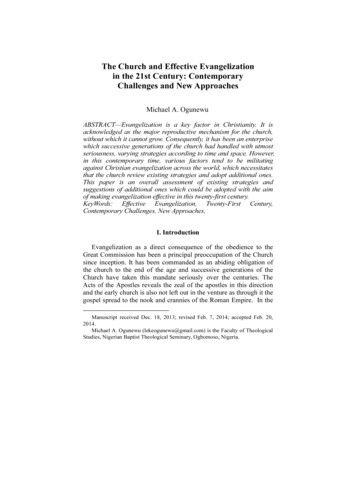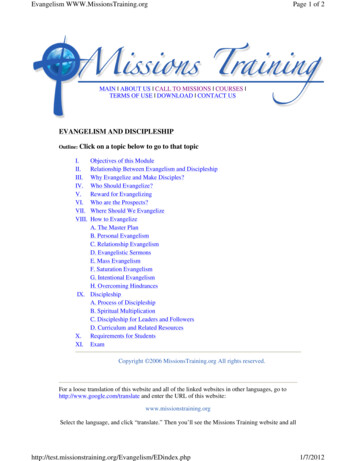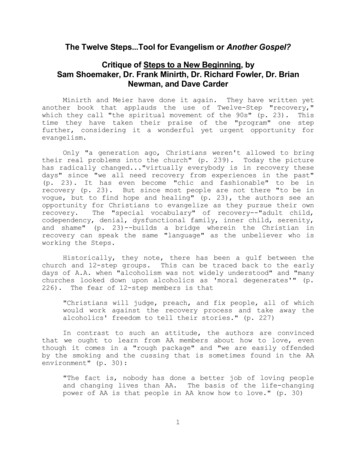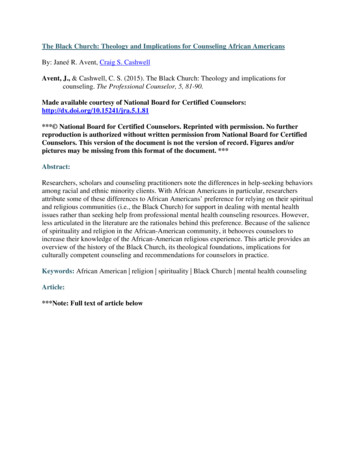
Transcription
The Church and Effective Evangelizationin the 21st Century: ContemporaryChallenges and New ApproachesMichael A. OgunewuABSTRACT—Evangelization is a key factor in Christianity. It isacknowledged as the major reproductive mechanism for the church,without which it cannot grow. Consequently, it has been an enterprisewhich successive generations of the church had handled with utmostseriousness, varying strategies according to time and space. However,in this contemporary time, various factors tend to be militatingagainst Christian evangelization across the world, which necessitatesthat the church review existing strategies and adopt additional ones.This paper is an overall assessment of existing strategies andsuggestions of additional ones which could be adopted with the aimof making evangelization effective in this twenty-first century.KeyWords: Effective Evangelization, Twenty-First Century,Contemporary Challenges, New Approaches,I. IntroductionEvangelization as a direct consequence of the obedience to theGreat Commission has been a principal preoccupation of the Churchsince inception. It has been commanded as an abiding obligation ofthe church to the end of the age and successive generations of theChurch have taken this mandate seriously over the centuries. TheActs of the Apostles reveals the zeal of the apostles in this directionand the early church is also not left out in the venture as through it thegospel spread to the nook and crannies of the Roman Empire. In theManuscript received Dec. 18, 2013; revised Feb. 7, 2014; accepted Feb. 20,2014.Michael A. Ogunewu (lekeogunewu@gmail.com) is the Faculty of TheologicalStudies, Nigerian Baptist Theological Seminary, Ogbomoso, Nigeria.
same vein, the church of the nineteenth and the twentieth centurywitnessed a tremendous quest for and emphasis on worldevangelization. This is apparent by the myriad of independentmissionary bodies which came into being during the time.Similarly, the 21st century Church is not relenting in its effort inthis direction. Many conferences on world evangelization have beenheld in the recent past and many declarations made. These have beenbacked with concrete actions which have seen the gospel messagepromoted into many countries of the world. Many Churchdenominations have over the years developed their own MissionBoards and Evangelistic groups which have performed tremendouslyin this regard. The Bible Societies around the world are continuallymaking the Bible available in the indigenous language of the peopleso as to expose them to the word of God. Millions unreached byresident missionaries have access to the gospel through missionaryradio and virtually every province and village is being penetrated withthe gospel in one way or the other. Also, Muslim lands are known tobe listening to Christian messages through broadcast in their ownlanguage or in one that may be understood in part.These attainments notwithstanding, there is still a lot of ground tobe covered. The new century presents some great and excitingchallenges to the Christian Church as series of changes – political,social, demographic, economic, philosophical, and religious - aredaily evolving in the world. The world population is increasing andnew communities are developing by the day. The world is becomingincreasingly integrated and we are becoming more aware andknowledgeable of various illnesses, injustices, problems and sufferingaround the world.The rampage of secular humanism; postmodernism; the relentless march of other religions, especially Islam;the holocaust of the HIV/AIDs virus and the nuclear threats in theMiddle and Far East; the growth of urbanization; the escalation ofcrime; the sexual shambles of our day; isolationism and the moraldecay in public life have all placed new demands on the Church. Thispaper examines these challenges and the way forward for the Churchirrespective of the rage. It argues that if the church is to effectivelycarry out this noble task, it must continually devise additionalapproaches to evangelization in the 21st century.66 Michael A. Ogunewu
II. Rationale for EvangelizationEvangelization is a key factor in Christianity. Christ desires thatHis church will continually expand. He expects it to grow bothquantitatively and qualitatively, from age to age, through the effortsof his disciples. The greatest tool that he has provided for this isevangelization. Evangelization is acknowledged as the majorreproductive mechanism for the church. Hunter (1983, p. 72)expresses this view when he defines evangelization as thereproductive process by which Christianity expands and fills the earth.In the words of Stott, if the church is to expand, it must embrace as itsforemost responsibility, the chief task of taking the Gospel into theentire world and making disciples of all nations (Stott, 1975, p. 31).The consensus within Christendom is that evangelization is theurgent and supreme task of the church. Meeks (1985, p. 138) says itis the responsibility of the entire church, and every individual ismandated to be personally involved in it. It is not a concept to bediscussed, but a mandate to be fulfilled. It is the primary andpermanent task of the church, without which it has no right to exist.The Christian community is here because of the Gospel. It exists toproclaim and enact the Good News of Jesus and to see the fulfillmentof that Gospel in the Kingdom of God (Knight & Murray, 2002, p. 1).Evangelization is therefore the work and heritage of the church.III. Nature of EvangelizationThe prominence given to this venture within Christianity has madeit a subject for critical study among scholars and Christian ministers.Volumes have been written with the aim of giving the concept theright interpretation in order to promote its understanding and enhanceits practice among Christians. One clarification of whatevangelization is all about is contained in the Lausanne Covenant(paragraph 4) and it reads thus:to evangelize is to spread the Good News that Jesus Christdied for our sins and was raised from the dead according tothe Scriptures, and that as the reigning Lord he now offersthe forgiveness of sins and the liberating gift of the Spirit toall who repent and believe. Our Christian presence in theworld is indispensable to evangelization, and so is that kindAAMM, Vol. 9, 67
of dialogue whose purpose is to listen sensitively in order tounderstand. But evangelization itself is the proclamation ofthe historical, biblical Christ as Saviour and Lord, with aview to persuading people to come to him personally and sobe reconciled to God. In issuing the gospel invitation wehave no liberty to conceal the cost of discipleship. Jesus stillcalls all who would follow him to deny themselves, take uptheir cross, and identify themselves with his new community.The results of evangelization include obedience to Christ,incorporation into his church and responsible service in theworld (Stott, 1975, p. 4).In the same vein the Berlin World Congress on Evangelismdeclares:Evangelization is the proclamation of the gospel of thecrucified and risen Christ, the only redeemer of men,according to the Scriptures, with the purpose of persuadingcondemned and lost sinners to put their trust in God byreceiving and accepting Christ as Savior through the powerof the Holy Spirit, and to serve Christ as Lord in everycalling of life and in the fellowship of His Church, lookingtoward the day of His coming in glory." It is "an affirmationconcerning all that is central in the work of Christ for menand in men; and all that is fundamental in that transformingexperience to which the exercise of personal faith in Christgives rise (Thompson, 1968, p. 37).One other prominent description of evangelization is that in thereport of the Archbishops’ Committee of 1981. Watson (1976, p. 25)quoted this thus: “to evangelize is to present Christ Jesus in thepower of the Holy Spirit, that men shall come to put their trust in Godthrough him and to accept him as their savior, and serve him as theirking in the fellowship of his church. The result of evangelizationincludes obedience to Christ, incorporation into his church andresponsible service in the World (p. 26).According to Miller (1993, p. 43), the English wordevangelization is derived from the Greek root “evangel” whichappears in the Bible as a verb and as a noun. The word is composedof two parts. The first part and root “angel” refers to a message, amessenger or the activity of delivering a message. The second partand prefix ev denotes the quality of goodness and identifies the nature68 Michael A. Ogunewu
of the message and the messenger. W. Wenhain (1980, p.196) alsoagrees with Miller, when he says, the word evangelization comesfrom “Evangelion” which means goodness and taken from the verb“Evangelisomai” which itself means ‘preach the good news’. Haynes(1937, pp. 3, 239) and Target (1968, p. 28) also share this view.Hacking (1987, p. 84) defines it as “the presentation of the wholechurch to the whole world.Green (1990, p. 554-555) explains that, early Christian preachingdid not merely proclaim religious duties or moral standards, or even areforming programme, but a person: one Jesus who was crucified andwhom the Christians knew to be alive. In other words, Green istelling us here that evangelization does not have to do with obeying aset of rules or an ideology, but proclaiming Christ and his redemptivework to the world. The crux of the matter is bringing people to asaving faith in Christ. It is the proclamation of the good news ofsalvation to men and women with the view to their conversion toChrist and incorporation into His church (p. 29).In his contribution, Sowale (2001, pp. 1-12) defines evangelizationas proclaiming the good news of the love of God as discovered in hisSon Jesus Christ, in the power of the Holy Spirit. It is sharing theLord Jesus Christ with the world. He explained further thatevangelization is far more than preaching to others, rather, it isbenefiting others out of the rich grace of God to which we(Christians) are endowed. Kumuyi (1990, p. 49) refers to it as the“heartbeat” of God and the commission, which God gave to thechurch. To neglect, ignore or reject this commission will amount toutter disobedience to the word of God. It is the urgent task for thechurch and every Christian. The assertion of all these scholars is thatevangelization is crucial to the survival of the church.IV. Goals of EvangelizationIf evangelization is the proclamation of the Gospel, what then arethe goals of this proclamation? What is this proclamation intended toachieve? In other words, what are the goals of evangelization? Firstthe primary goal of evangelization is the salvation of mankind. TheGreat Commission emphasizes the going into the world andpreaching the gospel to everyone (Mark 16:15). When the Lordcalled His first sets of disciples, He promised to make them fishers ofmen. The implication of this is that He has an assignment for themAAMM, Vol. 9, 69
which involve the fishing of men and women out of the ocean of sinand ungodliness into the kingdom of God. Hence, Peter describes thesalvation of the Christian as being called out of darkness into themarvelous light of God (1st Peter 2:9). The actual target of the gospelmessage is the unregenerate man - the man who is still in his sins.God loves the entire humanity and gave His son as a sacrifice fortheir sins (John 3:16). It is this message of the love of God to sinfulmankind that the disciples were commissioned to take into the entireworld. The Apostle Paul says – For I am not ashamed of the gospelof Christ: for it is the power of God unto salvation to everyone thatbelieveth, to the Jews first and also to the Greek.” (Romans 1:16).According to Kim (2001, pp. 15-20), the purpose of evangelization isto win a lost world to Christ.Next is the growth of the local Church. Evangelization isacknowledged as the major reproductive mechanism for the church.As earlier explained, the assertion is that just as procreation adds newmembers to the human race, evangelization properly practiced,enhances the overall growth of the church. Stott (p. 31) declares that,if the church is to expand, it must embrace as its foremostresponsibility, the chief task of taking the Gospel into the entire worldand making disciples of all nations. Hunter in his contributiondescribes evangelization as the reproductive process by whichChristianity expands and fills the earth (p. 72). Barret and Reapsoe(1988, pp. 78-82) says that the main objective of evangelization is forthe church with all its resources and all its agencies to fill the earthand quicken the whole life of the people in all ranks of the society,while Moffet (1992, pp. 207-209) is of the view that the major goal ofevangelization is the planting and growth of the church. In otherwords, evangelization is intended for the multiplication of the church,As men are won to Christ through the proclamation of the gospel,they become members of the church. Therefore, the local church canonly grow through evangelization. By growth we mean bothnumerically and spiritually. Both are quite important if the church isto be relevant in the world. Numerical growth has to do with itsquantity in number, while spiritual growth has to do with the level ofmaturity of the individual believers. Just as it is necessary for thechurch to grow in number, so also it is essential for the members togrow spiritually. The numerical growth deals with quantity, whilespiritual deals with quality. One must complement the other for thechurch to maintain a balanced development. Christians are expectedto become disciples so as to reproduce Christians. Evangelization as70 Michael A. Ogunewu
discussed therefore, has a two-fold dimension – that of makingChristians and developing the Christians into disciples.The assertion of some scholars is that evangelization should not beseen as a process intended only for the conversion of non-Christiansinto the Christian fold, but rather, it should be seen as a continuousprocess by which after conversion, the Christian is continuallynurtured into spiritual adulthood and grounded in the faith. Variousviews are expressed in this regard. Kane is of the opinion thatevangelization has a two – fold purpose, one immediate, and the otherremote. The immediate is the conversion of the individual and hisincorporation into the Christian church. The remote is theproclamation of the Lordship of Christ over all creation and theextension of the kingdom of God throughout the earth (Kane, 1992, p.D31). Edvardsen (1990, p. 197), sharing this view, emphasizes thatthere are two dimensions to proclamation in evangelization. The firstis proclaiming, evangelizing outside the church, outside the believers,reaching the unreached, reaching the unchurched. The other is toteach the converted and nurture them into mature Christians.Wagner (1987, pp. 53-54) is also of the same view. He says –“Evangelization cannot end with simply a decision, because trueevangelization church – growth evangelization means that the newChristian develops into fruit bearing disciples of Jesus Christ.” Townsemphasizes that although the Greek New Testament contains no wordtranslated “evangelization”; the concept and the imperative ofevangelization are integral and basic to its structure. Several NewTestament words clarify its meaning and emphasize its purpose. It isto preach, herald and teach the word, witness to the salvation of Godand make disciples for Christ (Towns, 1981, pp. 7-8). Coleman (1997,p. 101) states that the Great Commission is not merely preaching theGospel or baptizing a lot of people, nor teaching them precepts, but itis to “make disciples for Christ”. In the words of Toppo (2000, p. 21)the goal of evangelization can be considered both in a restricted andbroader sense. In the restricted sense, it is the proclamation of theGospel to non-Christians, whereby faith is awakened in them,however in a broader sense, it includes the process whereby the faithwhich is awakened in them is continually fostered and renewed fromtime to time.Ambroise (2000, p. 105), supporting this view, reiterates that theterm evangelization in this contemporary time is not confinedexclusively to the sense of preaching Christ to the non-Christians; it isalso used to strengthen the faith-formation of those who are baptizedAAMM, Vol. 9, 71
Christians but often neglected afterwards without a follow-up. Thus,he tried to differentiate between two concepts of evangelization,which are: evangelization and re-evangelization. Evangelization, hesays, is preaching Christ to the non-Christians. While reevangelization is the efforts made at refining the baptized Christiansand nurturing them into functional members of the Christiancommunity. In this context, the goals of evangelization are two-fold.One is the proclamation of the Gospel (kerygma) targeted at theunconverted in the world with the aim of winning them into thechurch.This is often referred to as outreach or apostolicevangelization. The other is teaching (didache) which is targeted atthe converted within the church, with the aim of making them betterChristians. This is otherwise referred to as pastoral evangelization ordiscipleship (Adekunle, 1998, pp. 55-67).Finally, evangelization properly prosecuted will also result in theoverall expansion of Christianity in the world. It is the only exercisewhich Christ left for the expansion of the church. Specifically, it isthe factor which decides the growth of the local church and theexpansion of Christianity in general. While the active involvement ofthe church in evangelization will lead to its expansion, a neglect of itwill definitely spell its doom. The church must therefore evangelizeif it is not to stagnate or completely fade out. Souls are perishing inthe world and God loves to save them. These however cannot besaved except they are aware of the plan of God for the salvation oftheir souls. There is therefore the need for those who have beenbeneficiaries of the message of salvation to extend the same to thosewho are yet to hear it. The scripture declares, “ for whosoever shallcall upon the name of the Lord shall be saved. How then shall theycall on him in whom they have not believed? And how shall theybelieve in him of whom they have not heard? And how shall theyhear without a preacher?” (Romans 10:13-14).The growth of the local church will definitely lead to theexpansion of Christianity in the world. It is in this regard that it isessential for the local church to maintain a balance in both its quantityand quality. Although numbers are essential, church growth is morethan just numbers. Numbers lead to numerical strength, but numericalstrength without corresponding spiritual development will not givethe church the level of development which will enable it to fulfill itsresponsibility to the world.72 Michael A. Ogunewu
V. Contemporary Challenges to EvangelizationA. HostilitiesOne of the challenges to evangelization is the challenge of hostility.Today, there are open hostilities against the Church in many nationsof the world. A typical example is the Boko Haram insurgences in thenorthern part of Nigeria. Also in certain parts of the world, violenceof various magnitudes is perpetrated in the name of religion andmostly against Christianity. Religious violence is not new in theworld, particularly in Nigeria; however, the dimension introducedinto it since the September 11 2001 attack on America is bewildering.Specifically in Nigeria, the reign of terror of the Boko Haram Islamicsect had heightened insecurity in the land, especially in the northernpart. Since the encounter of the group with security forces in the year2009, it has gone wild, attacking some key government formations,continually engaging in a running battle with security forces, andkilling innocent citizens all over the place. Unfortunately, Christiansand the church have been one main target of the group and manychurches have been bombed in recent times. Churches were bombedin Mandalla, Jos, Kaduna, Zaria, Lokoja and Kano, all in the northernpart of the country. This has serious implications for worship andevangelism. It is no longer safe to worship in churches, not tomention conducting open air evangelistic campaigns or any form ofevangelistic endeavor. This is an indication that if the church mustcontinue in evangelization, which is considered its supreme task, itmust evolve new ways of doing it.B. Demographic ChangesNext is the changing nature of the society. Society is a variablefactor that constantly changes. Time factors influence both cultureand society. Cultures and societies change from one period of time toanother. There is the tendency to assume that activities, forms andmethods, which were relevant in a past era, are equally relevanteverywhere for all times. This will not always be so. Such falseassumptions, however, turn variable factors into constant and rendergood intentions ineffective. Therefore, in this regard, there is theneed for the church to move with time in the task of evangelization.Hence, methods of evangelization will perpetually witness dynamism.Adiele (1990, pp. 87-101) is of the view that, although the message ofAAMM, Vol. 9, 73
the church is ageless, the audience and methods are subject to changewith time and place. He observed that quite many strategies, whichwere relevant in the past, have been overtaken by time andcivilization. The Christian message is constant, but since the societyis a variable factor, which changes, there is the need to deviseappropriate means of reaching the world with the message from timeto time.Other changes around the world are those occasioned byglobalization, scientific discoveries and demographic changes. In ourcontemporary world, the concept of globalization is assuming greaterprominence by the day as the word globalization itself has becomealmost a household term. The phenomenon of globalization assistedby scientific discoveries pervades every aspect of human life,materially and spiritually, across the continents of the world. Thereseems to be no single sphere of human life - political, economical,social, cultural and spiritual - that is not affected by this phenomenon.There is a revolution in the means of travel, communication and waysof doing things in general. Consequently, we live today in a scientificworld characterized by many technological advances and wonders.But just as science is producing a lot of goodies for humansatisfaction and consumption, so it is also producing things that areinjurious to mankind. Medicines, automobiles, and various forms ofinformation and communication technologies which are adding valueto life are well the inventions of science. In the same vein, sciencecan produce weapons of mass destruction, global pollution,dehumanized lifestyles, unjust economic systems, dysfunctionalfamilies and disintegrated societies (Blackman, 2001, p. 373-374).The Church as a global institution, with the global mandate toevangelize this world, which is continually being reshaped bytechnological changes and modern ideologies, is therefore faced withserious challenges because all these have significant implications andgrave consequences for evangelization around the world.Many nations of the world are today being ravaged by wars andconflict of one form or the other. In recent times, the continent ofAfrica has become a place where war is rampant, hunger is prevalent,poverty prevails, and where sicknesses and disease are vastlyconquering. The many peace organizations – United Nations (UN);North African Treaty Organization (NATO); African Union (AU); etc.– are doing their best to keep the world at peace. Various peacepromoting statements have been made through charter, declarationsand conventions, to enhance the process of achieving peace in the74 Michael A. Ogunewu
world, yet peace and orderliness have continued to elude our world.Consequently, there are assertions in certain quarters that only Christ,the Prince of Peace, can speak peace into the chaotic situation of ourworld, and this has made the work of evangelization more pivotalthan ever before.Another aspect of these changes from the Nigerian context is thechallenge posed to Christianity by the two other religions within theenvironment – Islam and African Indigenous Religion. Apart fromthe hostility occasioned by Islam against Christianity, these tworeligions have adopted modes of evangelization, which were hithertothe exclusive preserve of Christianity. Radio advertisement, ginglesand the use of literature, posters and publication of books are todaybecoming prominent part of Islamic evangelization. In the same vein,many of the traditional festivals, which are considered by Christianityas having elements of idolatry, have become international events andare constantly receiving media attention. The seriousness of thesituation could be seen in the words of Falako which states:Today, people are not ashamed of being identified asOlorisa or Aborisa (idol worshipper). They copy Christianevangelistic ways and manners-strategies. They publicizeannual Egungun, Obatala, Oro and Igunnuko festival on theelectronic and print media. Posters and banners are printedand pasted at strategic locations in the city to createawareness. The rich among them print images of their idolson vests, caps, handkerchiefs, calendar and the like . . . .(Falako, 2005, pp. 184-185).Gone are the days when these religious festivals were consideredarchaic and the exclusive preserve of the non-literate members of thesociety. Today they are becoming quite attractive to the elite andintellectuals in our societies and the experience is not limited toNigeria. In the face of all these challenges, the church has no optionthan to utilize every means within its disposal for the propagation ofthe gospel.C. Non-Christian Religious Movements and IdeologiesIn this 21st century, a new generation is emerging; bringing with itthe rise of a new culture, a new value system, and a new languagethat seems to challenge and upset old paradigms of doing ministry.AAMM, Vol. 9, 75
Today’s series of non-Christian ideologies and movements areevolving in our world. One of these is Postmodernism. We observedthat Christians with postmodern mindsets embrace doubt - they arenot sure if God exists; they aren’t sure if Jesus rose bodily from thedead; they aren’t sure the Bible is God’s Word; hence they believe theBible is a human book with errors in it. They are not sure if there islife after death and they doubt if there is anything like everlasting life.Apart from Postmodernism, a series of other movements and theirideologies are continually emerging. Obviously, many of them setthemselves against Christianity because of their anti-Christian stanceand teachings. The situation is indeed a sensitive one. This is becausethese various ideologies and teachings are subtle and as often as notpeople absorb them to produce attitudes. They breathe them in like air,unconscious and unaware of their effects. Incidentally too, theenvironment is so bombarded with such ideologies that we scarcelyhave time to interact with them before they are digested. But theyhave their effect. We may think of ideas as lifeless abstractions, aspieces of art that we can either appreciate or ignore. But in fact, theyare real and have their effect whether positive or negative. All thesesituations have serious implications for Christian maturity and soundspirituality which are expected results of evangelization and thereforecall for a review of the various approaches to evangelization.VI. Approaches in EvangelizationIn trying to communicate the Christian faith to men, differentapproaches have emerged over the centuries. Each has certainstrengths and weaknesses, which may be seen simply by reflectingupon them. Each method has been used at various times in thehistory of the church. Adiele identifies and discusses seven strategies,which characterized the missionaries’ proselytization in SouthEastern, Nigeria. These are: conventional church services, door-todoor preaching, open-air preaching, the Christian village, the wardsystem, use of medical care and allied institutions, the school andallied institutions. However, he remarked that some have not beenable to stand the test of time, others have been taken over by thegovernment, and only a few have survived until now (pp. 87-101).Olayiwola (1987, pp. 40-56) mentions those methods employed bythe Aladura Churches in Yorubaland, Nigeria. These include powerand authority of prayers, prayer-aid, use of charismatic gifts, healing,76 Michael A. Ogunewu
worship, and effective propaganda machinery. Hill (1973, p. 74)mentions seventeen forms which include, Personal Evangelization,Parish/ Local Church Evangelization, Rural Evangelization, UrbanEvangelization, Industrial Evangelization, Visitation Evangelization,Hospital Evangelization, Prison Evangelization, Women and MenEvangelization, Film Evangelization and a host of others. Ajayi(2005, pp.1-2) mentions seven: Personal Evangelization, ion,Follow-upEvangelization, Radio Evangelization, Television Evangelization, andCinematographic Evangelization. In this article, we shall examinethose that are prevalent and a few that could be added as supplements.A. Missionary ActivitiesOne principal method of evangelization has been missionaryactivities which have been carried out all over the world by ChristianMissionary Societies. A line of distinction is sometimes drawnbetween missions and evangelization, missions being conceived of asthe bringing of the gospel to the unsaved at a distance, andevangelization being thought of as bringing of the gospel to theunsaved that are near at hand. However, according to Kuiper (2002, p.7) that restricted usage of evangelization is difficult to justify, asmissionary activities have over the centu
In the same vein the Berlin World Congress on Evangelism declares: Evangelization is the proclamation of the gospel of the crucified and risen Christ, the only redeemer of men, according to the S











